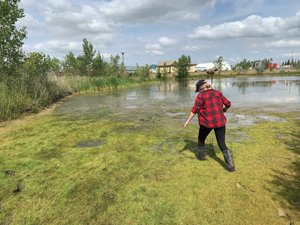Current Temperature
1.3°C
Take steps to minimize West Nile Virus this summer
Posted on July 28, 2020 by Sunny South News Sunny South Photo Submitted by Liz Allen
Sunny South Photo Submitted by Liz AllenBy Nikki Jamieson
Sunny South News
Temperature and water level gauges are being installed in storm ponds this month to monitor for mosquito activity in Coaldale.
Funding for the sensors was approved by town council in the town’s 2020-2022 Operating Budget for the ponds in and around Phase 2a of the Malloy Drain complex. Funds were also approved to hire a pest control company that has been actively testing the stormwater holding cells throughout town for mosquito larvae.
“So far, the consultant has found very little activity within the ponds due to a vibrant natural habitat with minnows and other mosquito predators,” said Kalen Hastings, town CAO. “It has also been cool during the evenings, along with wave action created by wind, which make it difficult for mosquitoes to breed.”
The town’s storm water ponds were drained down for the month of June, as historically, that was the month the town receives the most rainfall. However, for the rest of the summer, the storm ponds will be maintained at a higher depth, as it is typically hotter and drier during this time. The town will also activate the Malloy Drain waterfall on the south side of Coaldale, so water will continue to flow through the Malloy Drain system.
“Everybody plays a part in reducing the breeding conditions for mosquitoes. Ensuring that animal dishes or bird feeders or tires — many objects on private property — can become breeding ground for mosquitoes,” said Hastings. “The town is actively testing its own ponds for mosquito larvae, and will apply BTI, a larvicide, when mosquito larvae are detected.”
The town had announced that they would be considering mosquito mitigation methods during last fall’s budget deliberations following the presentation of a July 2019 report on the investigation into the 2018 bird deaths at the Birds of Prey Centre in Coaldale, which test results determined to be from West Nile Virus. While the cause of the outbreak was reported to be inconclusive, the report made several recommendations, including having the town implement mosquito control measures.
While the Town of Coaldale is increasing it’s vigilance against mosquitoes, it is important to remember that mosquitoes are an issue across all of Alberta, and with them the threat of West Nile Virus.
WNV is a virus carried by mosquitoes which have become infected after feeding on infected birds or animals. While the vast majority of people who get bitten do not develop any symptoms, about 20 per cent can develop non-neurological syndrome, symptoms of which include being uncomfortable, including fever, chills, nausea, vomiting, fatigue, skin rash, swollen glands and headache, which typically go away. However, less than one per cent can develop the more serious neurological syndrome, whose symptoms include tremors, drowsiness, confusion, swallowing problems, high fever, unconsciousness, paralysis and even death.
WNV has been in Alberta since 2003, when Alberta reported it’s first confirmed case in a bird and it’s first human-case. In 2018, 432 clinical cases were reported across Canada with Alberta Health Services reporting 50 cases, 40 of which were from the south zone. However, in 2019 only 37 cases were reported in Canada, with AHS reporting four cases, one of which was in the south zone.
While weather patterns affect the breeding season of the mosquito, Alberta is heading into the time of year when the Culex Tarsalis, the species of mosquito that carries WNV, is typically the most active. This period typically lasts from the end of July to early fall, or until the first full frost comes, according to AHS.
While only some mosquitoes carry WNV, wherever they are there is always the risk of being infected by WNV, and your best defence against it is to avoid being bitten.
When engaging in outdoor activities, AHS recommends wearing a long-sleeved, light-colored shirt, pants and a hat so you stay covered, which will help prevent mosquito bites. They also recommend that you use a use an approved insect repellent, such as products that contain DEET or Icaridin, although they caution that you pay attention to the percentage of repellent based on age for children younger than 12 years old and to not use any on babies less than six-months old, and instead protect them with full-coverage clothing and a hat. Additionally, people are advised to stay indoors during dawn and dusk, when mosquitoes are most active.
You can help protect your home by ensuring there is no standing water around that mosquitoes can breed in.
To learn more about West Nile Virus and what precautions are necessary to reduce its risk, visit http://www.fightthebite.info.
Leave a Reply
You must be logged in to post a comment.

